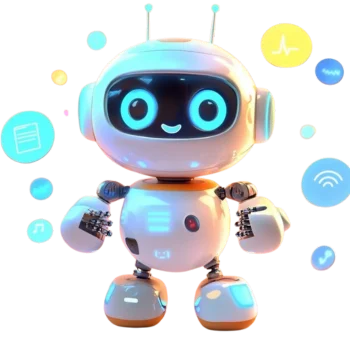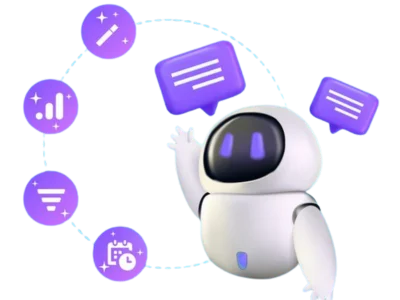Introduction
Blockchain and Artificial Intelligence (AI), two transformative technologies, are unlocking unprecedented potential when combined. Blockchain, renowned for its transparency and decentralization, addresses inefficiencies in traditional systems, while AI brings predictive analytics and automation. Together, these technologies enhance blockchain networks by optimizing consensus mechanisms, predicting congestion, and automating smart contracts. Developers at leading blockchain development companies are leveraging this synergy to create more efficient and scalable systems.
This blog explores how blockchain developers use AI to tackle challenges with practical insights, examples, and actionable takeaways.
To turn these ideas into production-ready solutions, partnering with expert AI development services can help you design, build, and scale your AI initiatives.

The Fusion of Blockchain and AI: A Transformative Partnership
Blockchain and AI complement each other beautifully. Blockchain secures and decentralizes data, while AI processes it to generate actionable insights. The result is an ecosystem where AI optimizes blockchain’s performance and solves its inherent challenges.
For instance, AI enables accurate time analysis of network activity, ensuring resources are allocated efficiently. This fusion enhances performance and opens up new possibilities in sectors like supply chain management, healthcare, and even governance.
Enhancing Consensus Mechanisms with AI
Consensus mechanisms are vital for blockchain networks, ensuring agreement across distributed nodes. However, traditional mechanisms like Proof of Work (PoW) and Proof of Stake (PoS) often face challenges such as energy inefficiency and latency. AI enhances these systems with innovative solutions.
- AI, Driven Validator Selection
In PoS systems, selecting reliable validators is crucial. AI analyzes historical data, trust scores, and performance metrics to ensure only the most dependable participants are chosen. This reduces the risk of malicious activity while improving network integrity. - Energy Optimization
PoW, though secure, is energy intensive. AI algorithms identify inefficiencies in mining processes, optimizing resource use and reducing energy consumption. This is particularly relevant as blockchain networks seek greener solutions. - Adaptive Consensus Models
AI introduces adaptability by enabling consensus mechanisms to adjust based on network conditions. For instance, during low traffic, the system can switch to a lighter protocol, conserving resources without compromising security. - Fraud Detection
AI’s predictive capabilities enhance security by identifying and neutralizing potential threats. By analyzing node behaviour, AI detects anomalies indicative of fraud, such as double spending or 51% attacks, safeguarding the network.
Predicting Network Congestion with AI
Blockchain networks often experience congestion, which leads to delayed transactions and increased fees. AI provides developers with tools to anticipate and address these issues before they escalate.
- Traffic Pattern Analysis
AI analyzes transaction history to predict peak activity. This helps blockchain systems allocate resources dynamically, preventing bottlenecks and ensuring seamless operation. - Dynamic Fee Adjustments
During congestion, fees often spike unpredictably. AI introduces fairness by adjusting fees based on predicted demand, encouraging users to transact during off-peak hours, and distributing load more evenly. - Load Balancing
AI-powered load balancing ensures no single node is overwhelmed. By intelligently distributing transactions across multiple nodes, the network reduces delays and improves overall efficiency. - Real-Time Alerts
AI monitoring systems provide real-time updates on network conditions. For example, users can receive alerts about impending congestion, allowing them to schedule transactions strategically.
For implementation, our AI consulting company can help you operationalize the strategies and use cases discussed in this article.

Automating Smart Contracts with AI
Smart contracts are pivotal to blockchain technology, automating agreements and eliminating intermediaries. However, they often suffer from rigidity, errors, and vulnerabilities. AI transforms smart contracts into adaptive and secure systems.
- Automated Smart Contract Audits
AI reviews smart contract code for errors and vulnerabilities, significantly reducing the risk of costly bugs. By leveraging deep learning, AI ensures contracts are robust and error-free. - Dynamic Contract Adaptation
AI enables smart contracts to adapt to real-world conditions. For example, a supply chain contract might adjust delivery terms based on weather forecasts or traffic patterns. - Predictive Dispute Resolution
Disputes in contract execution can cause delays. AI predicts potential conflicts by analyzing historical data and provides resolutions proactively, minimizing disruptions. - Enhanced Security
AI continuously learns from past security breaches, improving its ability to detect and prevent attacks like reentrancy or unauthorized access. - Intelligent Automation
AI agents automate repetitive tasks, such as verifying conditions or executing payments. This increases efficiency and ensures faster contract execution.
Real, World Applications of AI in Blockchain
Several blockchain platforms already demonstrate the powerful combination of AI and blockchain:
- Ethereum and PoS Optimization
Ethereum’s transition to PoS has opened doors for AI-driven validator selection and network optimization, which has significantly improved the platform’s scalability and energy efficiency. - Ripple’s AI, Powered Payments
Ripple leverages AI to predict network congestion and optimize cross-border transactions. This ensures faster and cheaper payments, even during peak activity. - Chainlink’s Smart Oracle Solutions
Chainlink integrates AI to enhance the reliability of decentralized oracles. Ensuring data integrity facilitates the execution of complex, real-world smart contracts.
Challenges and Opportunities
While the integration of AI and blockchain offers immense potential, challenges remain:
- Privacy Concerns: AI relies on large datasets, which can raise privacy issues in decentralized networks.
- Algorithm Transparency: Ensuring AI algorithms are transparent and unbiased is crucial for trust.
- Computational Costs: Running AI models on blockchain networks can be resource-intensive, necessitating optimized solutions.
Emerging technologies like decentralized AI and quantum computing promise to address these challenges, paving the way for even more efficient systems.
Jump Into Action: Hire a Blockchain Developer
Our team of expert Blockchain developers is on hand to assist you.

Benefits for End Users
The fusion of blockchain and AI doesn’t just benefit developers; it creates tangible improvements for end users:
- Reduced Fees: AI-powered optimizations lower transaction costs.
- Faster Services: Predictive analytics and automated processes ensure quicker transaction times.
- Enhanced Trust: Robust security measures and reliable smart contracts increase user confidence.
Conclusion
The combination of blockchain and AI is reshaping network efficiency, scalability, and security. With AI-driven insights, developers can optimise consensus models, predict congestion, and automate smart contract behaviour, creating systems that are more reliable and adaptive. Working with experts who understand both fields is essential for building advanced blockchain solutions. Partnering with an experienced enterprise AI development company ensures that AI integration is handled with precision, helping these technologies evolve together and strengthen the future of decentralised systems for businesses and users.



